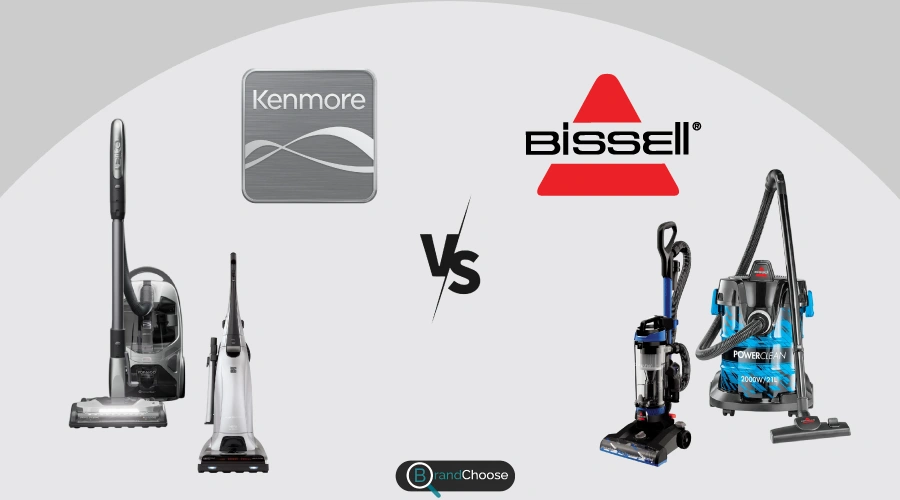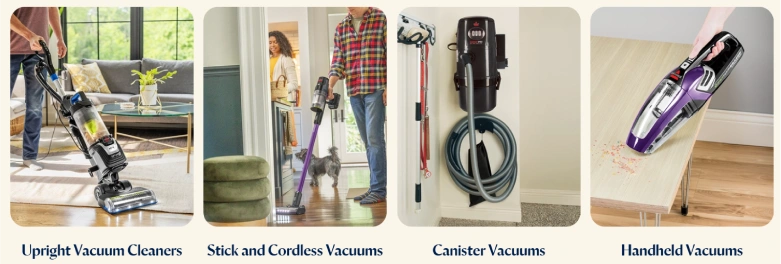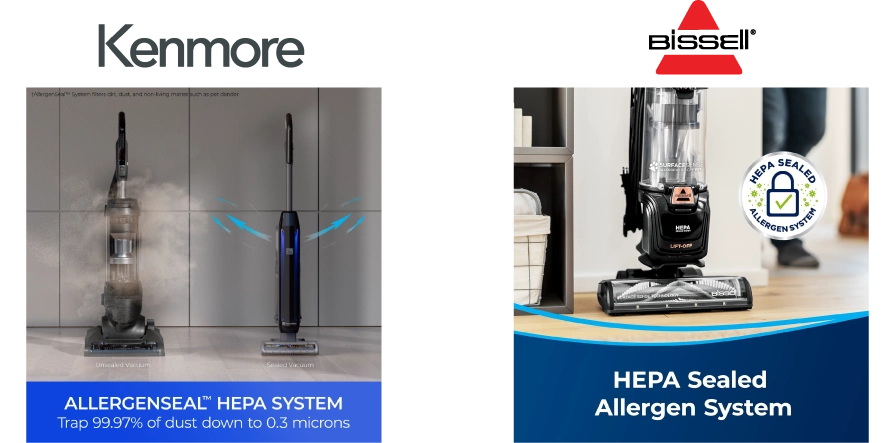When it comes to reliable vacuum cleaner brands, Kenmore and Bissell are two names that pop up often — and for good reason. Kenmore has long been associated with household appliance durability and balanced performance, while Bissell brings serious energy to pet-focused cleaning and affordability.
But which brand actually delivers the best bang for your buck in a vacuum? From suction power to filtration, usability to pet hair handling, we put these two brands head-to-head across all essential aspects.
Let’s dive deep and find out which one truly cleans up the competition.

Affordability
Bissell is unbeatable in terms of affordability, offering vacuums with great features at competitive prices. If you’re on a budget or need a vacuum for a smaller home, Bissell is a great option. Kenmore, while pricier, delivers superior performance and durability, making it a better investment for those who need a vacuum that lasts.
Winner: Bissell – Budget-friendly with strong value.
Build Quality & Durability
Kenmore vacuums are built to last with high-quality materials and a reputation for longevity. Users report Kenmore models lasting years, even with regular use. Bissell vacuums are more budget-friendly, and while they perform well in the short term, they may not be as durable in the long run compared to Kenmore’s more rugged build.
Winner: Kenmore – Trusted by generations of homeowners.
Products Variety
Kenmore offers a broad range of vacuums, including uprights, canisters, stick vacuums, and even robot vacuums. Their machines typically come with larger dustbin capacities, making them ideal for large spaces.

Bissell focuses more on lightweight stick vacuums and compact uprights, which are excellent for smaller homes but require more frequent emptying.

Winner: Kenmore – Perfect for big homes with larger cleaning needs.
Usability & Maintenance
Bissell vacuums are generally lighter, more agile, and easier to maneuver, especially the stick vacuums and compact uprights. Their bagless design makes maintenance simple, and they tend to operate more quietly than heavier models. Kenmore vacuums, particularly their canisters, can feel bulkier and more cumbersome, especially when navigating tight spaces. While they are louder during operation, they excel in tool storage and ease of maintenance, especially with larger bags and dustbins, reducing the need for frequent emptying.
Winner: Bissell – Lightweight and convenient for everyday use.
Smart Features, Innovation & Technologies
Neither brand is known for groundbreaking smart features, but Kenmore offers some high-tech vacuums with infrared dirt sensors and app-connected robotic models. Bissell, while it has some specialized features like Febreze® filters and Lift-Off® technology, is more focused on mechanical innovations rather than smart tech.
Winner: Kenmore – A step ahead with smart and specialized features.
Motor & Cleaning Power
Kenmore vacuums are built with high-powered motors that ensure strong suction across various surfaces. Their PowerFlow™ technology helps maintain suction even as the bag fills, ensuring consistent performance during cleaning. On the other hand, Bissell vacuums, especially models like the CleanView® and Pet Hair Eraser®, offer solid suction, but their performance tends to be more mid-range compared to Kenmore’s heavy-duty motors.
Winner: Kenmore – A powerhouse for deep cleaning.
Multi-Surface Capability
Kenmore excels in transitioning between different floor types, thanks to features like automatic height adjustment and specialized nozzles. These make it easy to switch from thick carpets to hardwood floors without losing suction power. Bissell also handles multiple surfaces well, with its Scatter-Free Technology and multi-surface brush rolls. However, it tends to be slightly less effective on thick carpets, where Kenmore holds an edge.
Winner: Kenmore – Versatile across all floor types.
Filtration System
Kenmore offers advanced filtration, including HEPA filters that capture 99.97% of dust and allergens, which is great for allergy sufferers. Bissell has SmartSeal® Allergen System filters, which are effective but don’t match the level of protection that Kenmore’s HEPA filtration provides.

Winner: Kenmore – Best choice for allergy prevention.
Pet-Friendly Cleaning
When it comes to pet hair, Bissell shines. Its Pet Hair Eraser® Turbo and ICONpet® models feature tangle-free brush rolls and pet-specific tools, making them ideal for homes with pets. Kenmore also performs well with motorized pet tools and strong suction, but Bissell’s specialized pet hair technology is more effective at preventing tangling and cleaning up after pets.

Winner: Bissell – Perfect for pet owners with tangle-free tools.
Conclusion
Kenmore and Bissell may target different audiences, but both are great in their own ways. Kenmore brings the muscle and long-term quality, while Bissell nails everyday convenience and pet-focused practicality.
At the end of the day, your cleaning priorities — power vs. portability, filtration vs. affordability — will determine which brand is the better fit for your home.

















